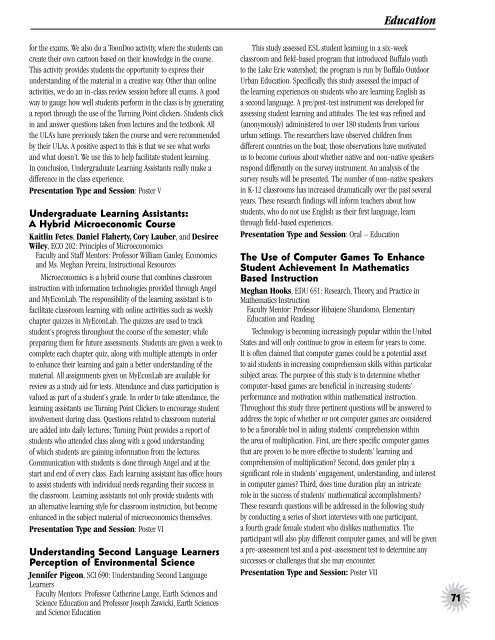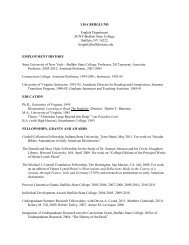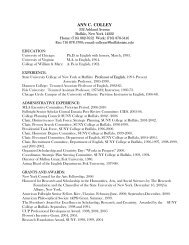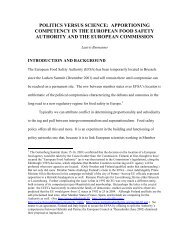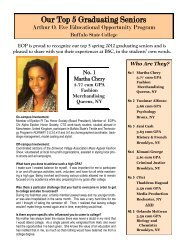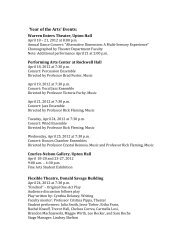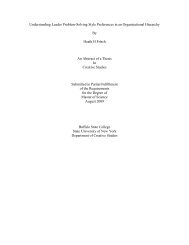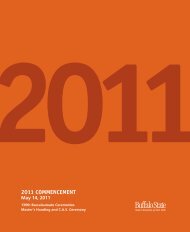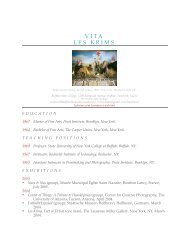Arts - Buffalo State College
Arts - Buffalo State College
Arts - Buffalo State College
Create successful ePaper yourself
Turn your PDF publications into a flip-book with our unique Google optimized e-Paper software.
for the exams. We also do a ToonDoo activity, where the students can<br />
create their own cartoon based on their knowledge in the course.<br />
This activity provides students the opportunity to express their<br />
understanding of the material in a creative way. Other than online<br />
activities, we do an in-class review session before all exams. A good<br />
way to gauge how well students perform in the class is by generating<br />
a report through the use of the Turning Point clickers. Students click<br />
in and answer questions taken from lectures and the textbook. All<br />
the ULA’s have previously taken the course and were recommended<br />
by their ULAs. A positive aspect to this is that we see what works<br />
and what doesn’t. We use this to help facilitate student learning.<br />
In conclusion, Undergraduate Learning Assistants really make a<br />
difference in the class experience.<br />
Presentation Type and Session: Poster V<br />
Undergraduate Learning Assistants:<br />
A Hybrid Microeconomic Course<br />
Kaitlin Fetes, Daniel Flaherty, Cory Lauber, and Desiree<br />
Wiley, ECO 202: Principles of Microeconomics<br />
Faculty and Staff Mentors: Professor William Ganley, Economics<br />
and Ms. Meghan Pereira, Instructional Resources<br />
Microeconomics is a hybrid course that combines classroom<br />
instruction with information technologies provided through Angel<br />
and MyEconLab. The responsibility of the learning assistant is to<br />
facilitate classroom learning with online activities such as weekly<br />
chapter quizzes in MyEconLab. The quizzes are used to track<br />
student’s progress throughout the course of the semester; while<br />
preparing them for future assessments. Students are given a week to<br />
complete each chapter quiz, along with multiple attempts in order<br />
to enhance their learning and gain a better understanding of the<br />
material. All assignments given on MyEconLab are available for<br />
review as a study aid for tests. Attendance and class participation is<br />
valued as part of a student’s grade. In order to take attendance, the<br />
learning assistants use Turning Point Clickers to encourage student<br />
involvement during class. Questions related to classroom material<br />
are added into daily lectures; Turning Point provides a report of<br />
students who attended class along with a good understanding<br />
of which students are gaining information from the lectures.<br />
Communication with students is done through Angel and at the<br />
start and end of every class. Each learning assistant has office hours<br />
to assist students with individual needs regarding their success in<br />
the classroom. Learning assistants not only provide students with<br />
an alternative learning style for classroom instruction, but become<br />
enhanced in the subject material of microeconomics themselves.<br />
Presentation Type and Session: Poster VI<br />
Understanding Second Language Learners<br />
Perception of Environmental Science<br />
Jennifer Pigeon, SCI 690: Understanding Second Language<br />
Learners<br />
Faculty Mentors: Professor Catherine Lange, Earth Sciences and<br />
Science Education and Professor Joseph Zawicki, Earth Sciences<br />
and Science Education<br />
Education<br />
This study assessed ESL student learning in a six-week<br />
classroom and field-based program that introduced <strong>Buffalo</strong> youth<br />
to the Lake Erie watershed; the program is run by <strong>Buffalo</strong> Outdoor<br />
Urban Education. Specifically, this study assessed the impact of<br />
the learning experiences on students who are learning English as<br />
a second language. A pre/post-test instrument was developed for<br />
assessing student learning and attitudes. The test was refined and<br />
(anonymously) administered to over 180 students from various<br />
urban settings. The researchers have observed children from<br />
different countries on the boat; those observations have motivated<br />
us to become curious about whether native and non-native speakers<br />
respond differently on the survey instrument. An analysis of the<br />
survey results will be presented. The number of non-native speakers<br />
in K-12 classrooms has increased dramatically over the past several<br />
years. These research findings will inform teachers about how<br />
students, who do not use English as their first language, learn<br />
through field-based experiences.<br />
Presentation Type and Session: Oral – Education<br />
The Use of Computer Games To Enhance<br />
Student Achievement In Mathematics<br />
Based Instruction<br />
Meghan Hooks, EDU 651: Research, Theory, and Practice in<br />
Mathematics Instruction<br />
Faculty Mentor: Professor Hibajene Shandomo, Elementary<br />
Education and Reading<br />
Technology is becoming increasingly popular within the United<br />
<strong>State</strong>s and will only continue to grow in esteem for years to come.<br />
It is often claimed that computer games could be a potential asset<br />
to aid students in increasing comprehension skills within particular<br />
subject areas. The purpose of this study is to determine whether<br />
computer-based games are beneficial in increasing students’<br />
performance and motivation within mathematical instruction.<br />
Throughout this study three pertinent questions will be answered to<br />
address the topic of whether or not computer games are considered<br />
to be a favorable tool in aiding students’ comprehension within<br />
the area of multiplication. First, are there specific computer games<br />
that are proven to be more effective to students’ learning and<br />
comprehension of multiplication? Second, does gender play a<br />
significant role in students’ engagement, understanding, and interest<br />
in computer games? Third, does time duration play an intricate<br />
role in the success of students’ mathematical accomplishments?<br />
These research questions will be addressed in the following study<br />
by conducting a series of short interviews with one participant,<br />
a fourth grade female student who dislikes mathematics. The<br />
participant will also play different computer games, and will be given<br />
a pre-assessment test and a post-assessment test to determine any<br />
successes or challenges that she may encounter.<br />
Presentation Type and Session: Poster VII<br />
71


